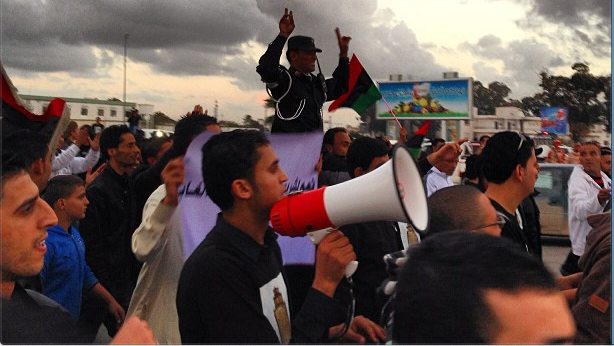By Nihal Zaroug.

Tripoli, 30 December:
During Thursday’s press conference, Deputy Prime Minister Awad Al-Barasi reiterated the government’s support for the integration . . .[restrict]of former revolutionaries into the police and army, noting that all brigades would have to join these state institutions. In future, the existence of such brigades would be illegal.
Exactly when this will happen is still unsure. The head of the SSC in Tripoli, Hashim Bishar, said in October that the organisation would cease to exist by tomorrow, the end of the year. But since then Prime Minister Ali Zeidan has told the Libya Herald that it would still continue “for a while”. Nonetheless, many SCC members have been signing up to join the police and army, despite the fact that the pay in both organisations is lower than in the SSC.
Earlier this month it was announced that in just two days some 1,500 members of the SSC in Benghazi had applied to join the police there.
Since taking office, Interior Minister Ashour Shuwail has laid out clear plans to get the country’s security on track trough the collection of weapons, increased policing, the formation of a professional army and security forces. However, Shuwail’s immediate concern has been the deteriorating security situation in Benghazi.
The city, known as the cradle of the revolution, has become an epicentre of violence and targeted killings, particular after the death of US Ambassador Chris Stevens and more recently following the assassination of Benghazi’s police chief Faraj Drissi. The city’s police force has come under repeated attack leading to the death and injury of several police officers. This wave of lawlessness has been tied to attempts to release a suspect arrested in Drissi’s murder, as well as a show of force by armed groups beyond state control, generally believed to be extremists.
Friday’s “Save Benghazi Friday” protesters came out in support for the army and police, and to put an end to all militias. According to activist Bilal Bettamer, security forces were on hand to protect and direct the protest, and were greatly applauded for the role they played.
Bettamer was among those who organised “Rescue Benghazi”, a mass protest against armed groups that took place in the wake of the US consulate attack in the city. The lead organiser of the protest, Naji Hamad, narrowly escaped an attempt an his life earlier this month, however, the assault killed Hamad’s brother -in-law, Anees Al-Jahani.
Deputy Premier Barasi also stated that the government would present the General National Congress (GNC) with the Justice Act for approval this week and that a draft law criminalizing torture and arbitrary detention would soon be submitted.
In May, Libya’s National Transitional Council (NTC) passed Laws 35 and 38, which grant broad amnesty for crimes committed during the 17 February uprising by those “promoting or protecting the revolution”. Barasi did not address the fate of both laws, which have been greatly scrutinized by local and international groups.
While addressing the Security Council in November, International Criminal Court’s (ICC) chief prosecutor, Fatou Bensouda, called on Libya’s new government “to ensure that there is no amnesty for international crimes and no impunity for crimes, regardless of who the perpetrator is and who is the victim”.
Lawyers For Justice in Libya (LFJL), an influential group of lawyers, have stated that such laws are a backward step on the country’s path to establishing a society based on human rights, the rule of law and democracy. [/restrict]







